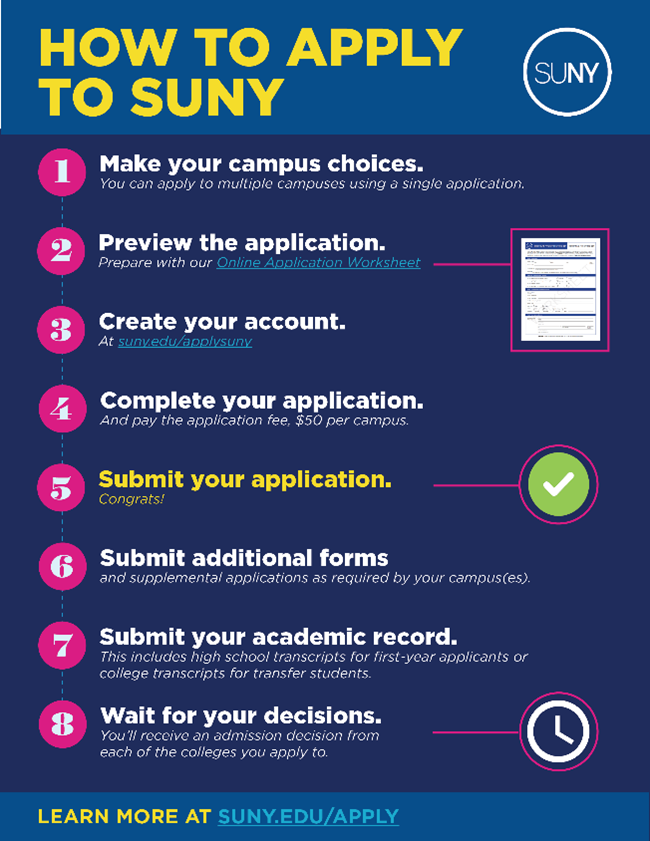Unravel the mystery of SUNY admissions with our comprehensive step-by-step guide. Find your way through the maze with ease!
Table of Contents
- What is SUNY?
- Admissions Requirements
- Application Process
- Financial Aid and Scholarships
- Campus Visits and Interview Process
- Decision Process
- Conclusion
The State University Of New York (SUNY) system is renowned for its diverse campuses and extensive range of academic programs. Navigating the admissions process can be overwhelming for prospective students, but with the right guidance, it can be made more manageable.
What is SUNY?
The State University of New York is the largest comprehensive university system in the United States. Our impact in New York State and across the globe begins with our 64 institutions, including research universities, academic medical centers, liberal arts colleges, community colleges, colleges of technology and an online learning network. We serve nearly 1.3 million students in credit bearing courses and programs and through continuing education and community outreach programs. Our nearly 3 million SUNY alumni are located around the globe, each making their own unique impact.
SUNY was created out of a commitment to opportunity and access, and designed to meet diverse needs across a vast geographic landscape. We reflect both the land grant mission reborn and a reputation for embracing new thinking and brighter ideals. Our faculty and students are constantly seeking, generating, analyzing, and sending knowledge back into the world through informed citizens, revitalized communities, and experts who transform entire sectors.
SUNY’s colleges and universities are state-supported and our graduates have been giving back and transforming the lives of local and global citizens since we were established over 70 years ago. Millions of SUNY alumni are working in their communities every day, changing and improving the world with exceptional contributions—whether defined as a medical breakthrough, a technological innovation, an inspirational piece of art, or the birth of a new business.
By leveraging our talents and resources in targeted, quantifiable ways, we bolster New York’s economy and enhance quality of life for its citizens. Learn more about the Power of SUNY, where we outline our goals and firm intentions.
History
New York was one of the last states to set up a state college and university system. The first colleges were established privately, with some arising from local seminaries, and New York State had a long history of supporting higher education before the creation of the SUNY system. The oldest college that is part of the SUNY System is SUNY Potsdam, established in 1816 as the St. Lawrence Academy.
Admissions Requirements
Prospective undergraduate students applying to SUNY must meet certain general admission requirements, such as submitting high school transcripts, standardized test scores (SAT/ACT), letters of recommendation, and a personal essay. Depending on the chosen program, specific requirements related to GPA, prerequisite courses, and additional assessments may apply.
Unlock your potential and conquer the SUNY admissions maze with this step-by-step guide! #collegebound #SUNYadmissions [insert link]
Application Process
Applying to SUNY involves a series of steps that prospective students must follow diligently. The application process typically includes submitting an online application form, paying the application fee, sending in required documents, and meeting application deadlines. It is essential for applicants to review and understand each campus’s specific requirements to ensure a successful application.

Image courtesy of blog.suny.edu via Google Images
You may like : University of Pennsylvania Online Programs: Degrees and Certificates
Financial Aid and Scholarships
Financial aid options are available for SUNY students to help make higher education more accessible. These options include federal grants, state aid programs, scholarships, work-study opportunities, and student loans. Prospective students are encouraged to explore all avenues of financial assistance and apply for scholarships offered by SUNY and external organizations to offset the cost of tuition.
Campus Visits and Interview Process
Visiting SUNY campuses and attending information sessions can provide valuable insights into campus life, academics, and extracurricular opportunities. Additionally, some programs may require interviews as part of the admissions process. Prospective students should prepare for interviews by researching the program, showcasing their strengths and experiences, and demonstrating their enthusiasm for the field of study.
Image courtesy of www.gateschili.org via Google Images
Decision Process
After submitting their applications, prospective students can expect to receive admission decisions within a specific timeline. Once admitted, students must carefully review their offer letters, understand any conditions or requirements for enrollment, and follow the necessary steps to accept their admission to SUNY. It is essential to stay organized and informed throughout the decision-making process.
Conclusion
In conclusion, navigating the SUNY admissions maze requires careful planning, attention to detail, and a proactive approach. By understanding the admissions requirements, following the application process diligently, exploring financial aid options, visiting campuses, and preparing for interviews, prospective students can increase their chances of securing admission to SUNY and making an informed decision regarding their higher education journey.




